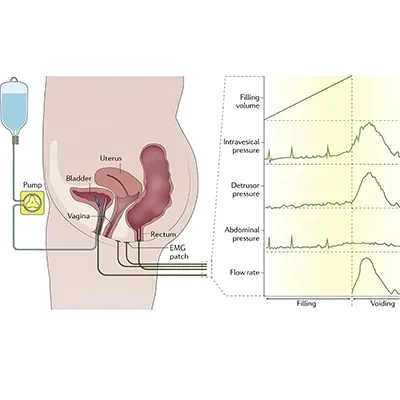
Expert Urodynamic Evaluation & Treatment for Neurogenic Bladder in Ahmedabad
Urodynamic studies (UDS) are diagnostic tests used to evaluate bladder function and assess the impact of neurological conditions on urinary control. These studies are particularly important for patients with neurogenic bladder, a condition where nerve damage impairs bladder function due to neurological disorders. Understanding the role of UDS in evaluating neurogenic bladder helps guide effective treatment and management strategies.
UDS typically involve several tests to evaluate different aspects of bladder function :
- Uroflowmetry : Measures the rate of urine flow and the volume of urine voided to assess bladder emptying efficiency.
- Cystometry : Evaluates bladder capacity, compliance, and pressure by filling the bladder with fluid and monitoring the pressure and sensations during the filling and voiding phases.
- Pressure Flow Studies : Assesses the relationship between bladder pressure and urine flow to evaluate the bladder’s ability to empty effectively.
- Electromyography (EMG) : Records the electrical activity of the pelvic floor muscles and sphincters to evaluate their function and coordination.
- Post-Void Residual Measurement : Determines the amount of urine remaining in the bladder after voiding to assess bladder emptying efficiency.
Understanding and utilizing urodynamic studies for evaluating neurogenic bladder is essential for providing a comprehensive assessment of bladder function. Accurate diagnostic information from UDS guides effective treatment planning and helps improve urinary health and quality of life for patients with neurological conditions.
Common Indications for Urodynamic Studies in Neurogenic Bladder
Why This Procedure is Important?
Urodynamic studies are crucial for accurately diagnosing and managing neurogenic bladder by providing detailed information about bladder pressure, capacity, and function. These studies help identify specific bladder dysfunctions, such as detrusor overactivity, reduced bladder compliance, or sphincter dysfunction. Understanding the nature and extent of bladder impairment enables clinicians to design effective treatment plans, including medication, behavioral therapies, or surgical interventions. Timely and accurate diagnosis through UDS can prevent complications, improve urinary function, and enhance the overall quality of life for patients with neurogenic bladder.
Best Urologist for UDS & Neurogenic Bladder Treatment in Ahmedabad
Dr. Kalpesh Kapadia
MCh(GenitoUrinary Surgery-Urology)
GoldMedalist
FMAS
Dr. Kalpesh Kapadia, with over 15 years of experience, is a highly skilled urologist specializing in a comprehensive range of urological disciplines, including andrology, laparoscopic and robotic urology surgeries, female and pediatric urology, uro-oncology, reconstructive urology, and neuro-urology.
Holding an M.Ch in Genito-Urinary Surgery from B.J. Medical College, Ahmedabad, Dr. Kapadia has a distinguished academic background and extensive expertise in managing prostate cancer and other complex urological conditions. His advanced proficiency in minimally invasive techniques, including laparoscopic and robotic surgeries, ensures precise tumor removal, effective treatment, and optimal recovery.
Committed to delivering exceptional patient-centered care, Dr. Kapadia is the ideal choice for those seeking expert urological treatment with a focus on achieving the best possible outcomes and enhancing overall well-being.
Need Best Urology Hospital Near You?
24 x 7 Emergency Service
and effective treatments. This enables us to provide you with the highest standard of care.


